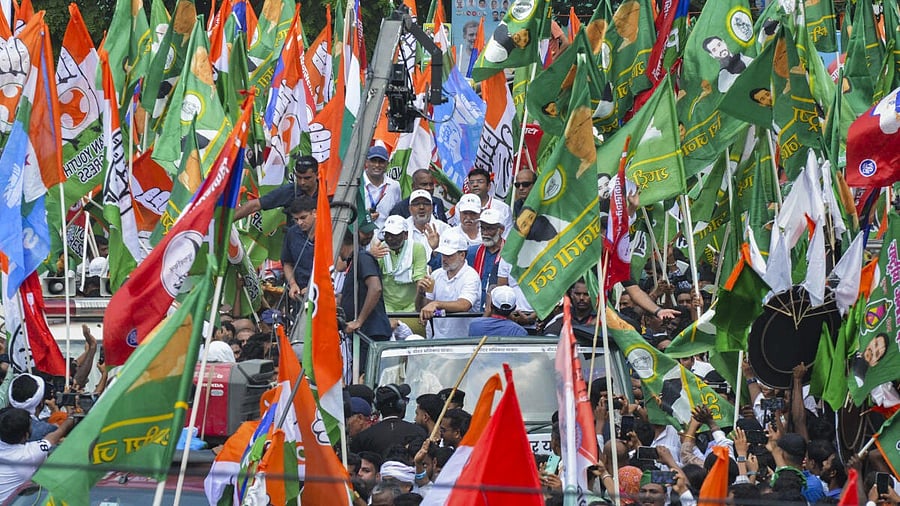
Voter Adhikar Yatra in Patna
Credit: PTI Photo
Congress leader Rahul Gandhi’s ‘Vote Adhikar’ yatra in Bihar, accompanied by allegations of systematic vote chori (vote theft), has for now united the fractious I.N.D.I.A. bloc around a common battle cry.
The Opposition is attempting to construct a sweeping narrative — one that portrays the ruling Bharatiya Janata Party (BJP) as an entity actively undermining democracy in alleged collusion with weakened institutions, particularly the Election Commission of India (ECI).
Terming the recent Special Intensive Revision (SIR) exercise in Bihar an attempt at vote chori, Gandhi has promised a major new exposé, vowing to drop a ‘hydrogen bomb’ that would far surpass his previous ‘atom bomb’ revelation on Mahadevapura; thus, signalling his intent to continue with this line of action.
The question, however, is: will this narrative escape the elite echo chamber and find resonance on the street?
The power of a potent slogan/theme to rally voters was seen in the 2024 general elections when the Opposition campaigned stressing that if the BJP were to return to power with a majority it would ‘change the constitution and end reservation’. Can vote chori achieve a similar impact? Or will it be drowned out by the BJP’s organisational muscle and communication dominance?
Prima facie the narrative is a masterstroke. It moves beyond routine criticism of policy decisions to allege that democracy in India is being hollowed out from within. For the urban, educated elite, this deeply resonates. Concerns over EVM reliability, the autonomy of the ECI, and institutional integrity are staples of drawing-room debates and media discourse. It grants the Opposition the moral high ground, framing its fight not as a mere quest for power, but as a righteous defence of democratic foundations. It’s an issue that theoretically transcends caste and class, touching the very core of electoral legitimacy.
Yet, Indian electoral history shows a stubborn preference for the tangible over the abstract.
The urban middle class, while vocal online, is notorious for its low voter turnout, and is often least concerned about the purity of electoral rolls. For the majority of rural and semi-urban voters, for whom daily survival is paramount, the concept of vote theft can feel distant and procedural. Unlike the immediate threat of reservations being scrapped — which directly targeted caste identity and economic mobility — an abstract anxiety about democracy rarely factors into the calculus of livelihood. Unless it is powerfully linked to concrete consequences — a job lost due to unfairness, a welfare benefit denied, or a community’s voice silenced — it risks being a slogan that energises TV panels more than it moves voters.
This highlights the crucial weakness in the bloc’s approach. The BJP possesses a ruthless agility for narrative jiujitsu, effortlessly turning attacks into endorsements. We saw this with the ‘Main Bhi Chowkidar’ rebranding of the ‘Chowkidar Chor Hai’ jab. The vote chori allegation is already meeting the same fate. Rather than defending the charge, Prime Minister Narendra Modi has accused the I.N.D.I.A. bloc of personal abuse and elitist conspiracy.
By framing him as the victim of a disrespectful Opposition, he deflects the institutional critique and deepens his connection with his voter base. This reframing doesn't just neutralise the Opposition's slogan, it traps it in the web it has spun.
Furthermore, Indian politics has consistently shown an affinity for muscular leadership over procedural purity. Voters have often favoured leaders who project strength, resolve, and a guarantee of stability — a trend exemplified by Indira Gandhi’s post-Emergency return on the slogan of ‘Garibi Hatao’, and Modi’s electoral wins since 2014. Allegations of centralisation and institutional override can be, and have been, repackaged by the BJP not as democratic deficits, but as evidence of decisive, purposeful leadership. For a significant portion of the electorate, a strong leader is not a threat to democracy, but its protector.
An important litmus test for this narrative will be Bihar. With its complex caste arithmetic, politically aware electorate, and history of Mandal politics, the state is a proven bellwether. If vote chori can cut through entrenched caste identities and resonate with the state’s restless youth by linking the idea of electoral integrity to their specific grievances — denied rights, skewed development, inadequate representation — it could become a potent weapon. If it fails, it will confirm that the BJP’s combination of welfare delivery, nationalist pride, and perceived leadership strength remains an overwhelmingly force.
While the vote chori campaign has energised Congress' base and improved Rahul Gandhi’s standing within the I.N.D.I.A. bloc, its electoral impact is not yet clear. As a tool to win an election against a strong leader and a powerful party, vote chori remains a high-risk, high-reward strategy. Without meticulous ground-level translation into the local dialects of loss and injustice, it may simply be the right message preached to the wrong congregation.
Mahendra Kumar Singh is a political commentator and teaches Political Science at DDU Gorakhpur University, Uttar Pradesh. X: @MKSinghGkp.